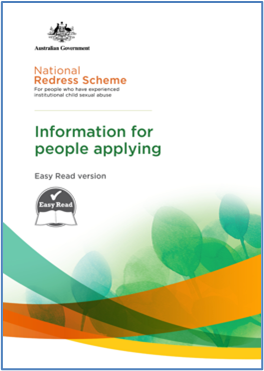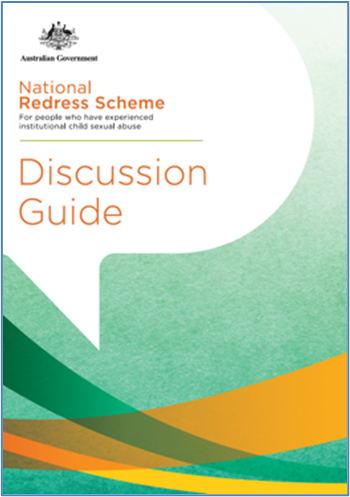How you can help raise awareness and understanding of the National Redress Scheme
The resources on this page have been designed to support professionals from support services and organisations who have contact with people with disability. You are often the first people that someone may talk to about their experience of sexual abuse.
You are in a strong position to refer people to, or help them understand, the National Redress Scheme and the free, confidential Redress Support Services.
On this page you will find resources to support you to have important conversations about the National Redress Scheme. Resources include a discussion guide, flip book and disability specific social media content. This page also contains resources to help people with disability understand and access redress, such as easy read factsheets and videos.
Organisations are encouraged to access the free resources and share these with their networks.
About the National Redress Scheme
The National Redress Scheme is for people who experienced child sexual abuse while in an institution such as a school, church or place of worship, mission, orphanage, foster care, hospital, detention centre or a sporting club. The abuse may have also happened during an activity that was organised by the institution, such as a swimming lesson.
The Scheme supports people to access redress, which can include a payment, counselling, and a direct personal response from the institution acknowledging and apologising for what happened.
Redress Support Services are available to help before, during and after applying. Redress Support Services are free, confidential, trauma-informed and culturally safe. They can provide emotional support and help with information about eligibility and help applicants fill out an application form. Specialised support is available for people with disability to find out more or apply for redress.
The Australian Government set up the National Redress Scheme after the Royal Commission into Institutional Responses to Child Sexual Abuse. It holds institutions accountable and offers people an alternative to pursuing institutions through the courts.
The National Redress Scheme started on 1 July 2018 and runs for 10 years. Applications to the Scheme should be submitted by 30 June 2027.
Videos about the Scheme
There are 2 animated videos and 1 case study video available for you to share with staff, members, clients and patients when communicating about the National Redress Scheme.
These videos are also available in Auslan.
There are more videos about the Scheme on the resources for professional services page. These include Auslan and audio versions, as well as easy read stories.
Visit the links below to watch and download videos and transcripts.
Animated videos
These videos are designed to simply explain the National Redress Scheme.
What is the National Redress Scheme - for people with disability Download the video pack (ZIP 10 MB) including:
| What is the National Redress Scheme - for carers of people with disability Download the video pack (ZIP 12 MB) including:
|
Auslan translation - What is the National Redress Scheme - for people with disability | Auslan translation - What is the National Redress Scheme - for carers of people with disability |
Case study video - Steven's story
This video features Steven, sharing his story about the National Redress Scheme.
Steven's story Download the video/audio pack (92 MB) including:
|
Auslan translation - Steven's story |
Resources available to order or download
There are a number of easy read factsheets and forms available to order or download to help people with disability when applying to the National Redress Scheme.
| Resource | Description | How to use |
|---|---|---|
National Redress Scheme Easy Read Factsheet  | Information about the National Redress Scheme in Easy Read format. | Print or order hard copies to distribute to clients, patients or staff, or make available at relevant facilities, waiting rooms, offices or venues. Download Easy Read Factsheet: |
National Redress Scheme Discussion Guide  | A resource to support frontline services and health professionals to talk about the National Redress Scheme with people who have experienced child sexual abuse while in an institution. The guide includes information about managing and responding appropriately to a client disclosure of institutional child sexual abuse. | Share with staff or members who have contact with clients and patients. Download Discussion Guide: |
National Redress Scheme flip book  | The flip book is a quick reference guide to help explain the National Redress Scheme, where to find more information and how to apply. | Share with staff or members who have contact with clients and patients. Download A5 Flipbook: |
National Redress Scheme social media kit    | Social media content, assets and guidance, including:
| Use the social content across social media channels to promote the National Redress Scheme. Download the social media kit (ZIP 8 MB), including post text, images and a suggested moderation guide. For additional support while issuing this content on social media, please email DSSRedressEngagement@dss.gov.au |
National Redress Scheme Poster  | A poster with information about the National Redress Scheme. | Print or order hard copies to display at relevant facilities, waiting rooms, staff rooms, offices or venues. Download Poster: |
| National Redress Scheme website | www.nationalredress.gov.au | Link to the website when communicating about the National Redress Scheme. |
| National Redress Scheme email updates | Monthly email updates about the National Redress Scheme. | Subscribe(Opens in a new tab/window) and encourage others to stay updated about the National Redress Scheme. |
Additional Easy Read resources
These easy read factsheets are available to download, and have been developed for staff who have contact with people with disability, to share with clients and patients.
| Easy read factsheet | Description |
|---|---|
What is the National Redress Scheme | Provides information about the National Redress Scheme. |
What does the Scheme offer | Information about the counselling, payment and direct personal response offers available as part of the National Redress Scheme. |
Who can apply for the Scheme | Information about who can apply for the National Redress Scheme. |
Applying for the Scheme | Information about how to apply to the National Redress Scheme. |
What happens when you apply for the Scheme | Information about what happens when you apply for the National Redress Scheme. |
Free Support Services | Information about the free support services available to people applying for the National Redress Scheme. |
Hearing and speech communication support
If you are d/Deaf, hard of hearing or have a speech communication difficulty you can use the National Relay Service to contact the department.
The National Relay Service has specially trained staff called relay officers who act as a ‘relay’ or a bridge between people who are d/Deaf hard of hearing or have speech communication difficulty, and the person or organisation they are calling.
The Access Hub website(Opens in a new tab/window) has instructions for many different relay methods including:
- TTY (Speak and Read, Type and Listen, Type and Read)
- Voice relay
- National Relay Service chat
- Video relay
- National Relay Service captions
- SMS Relay
Visit the Access Hub website(Opens in a new tab/window) to find a relay method that works for you.
Find out more and get in touch
If you have any questions about the National Redress Scheme communication materials or require any of these assets in other formats, please contact the National Redress Scheme on 1800 737 377, Mon to Fri 8am to 5pm. Or email DSSRedressEngagement@dss.gov.au
For more information about the Scheme, you can:
- contact a Redress Support Service
- call the Scheme
- go to the About, Applying and Institutions pages of this website.
If you or someone you know need immediate support, please contact:
- Beyond Blue(Opens in a new tab/window): 1300 224 636
- 1800RESPECT(Opens in a new tab/window): 1800 737 732
- MensLine Australia(Opens in a new tab/window): 1300 789 978
- Lifeline(Opens in a new tab/window): 13 11 14
- Suicide Call Back Service(Opens in a new tab/window): 1300 659 467
There are a range of other resources designed to support professionals and survivors, including resources for:
- First Nations audiences
- People from culturally and linguistically diverse backgrounds (translated in 10 languages)
- General audiences.